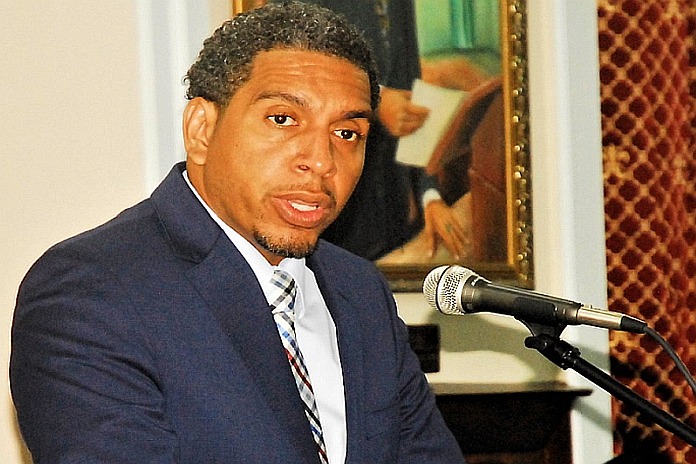
With the Covid-19 confirmed cases racking up in this country and with the pandemic wreaking havoc on commerce and trade as well as human capital in places like North America and some parts of Europe and the Caribbean, Minister of Finance Camillo Gonsalves says that the 2021 Budget Estimates “have been a particularly difficult set of estimates to compile for a host of reasons.”
As he rose to present the 2021 estimates in parliament on Wednesday, the finance minister acknowledged “the very hard and professional work” of the staff of his ministry and all the various ministries of the Government, reiterating that the process of preparing the budget estimates “has been a challenging one.”
“There are logistical challenges – when everyone is not in the office at the same time; and of course, more so than that, there are difficulties in projecting with the usual degree of certainty how the economy will perform in the coming year because of the tremendous uncertainties and complexities of looking through and beyond the pandemic and all of the vagaries that that implies. And also the potential challenges with – closer to home, like, most notably – the ongoing effusive eruption of the La Soufriere Volcano,” Gonsalves told the parliament.
In his presentation of the 2021 budget estimates of revenue and expenditure, which amount to $1,212,601,578, Gonsalves said the amount represents an increase of 2.2 percent over the budget approved for 2020.
Recurrent Expenditure, inclusive of amortization and sinking fund contributions amount to $895,199,329; Capital Expenditure amount to $317,402,250.
Financing of the expenditure is expected to come from current revenue of $647,386, and capital receipts of $565,215,575.
The Current expenditure, exclusive of amortization and sinking fund contributions, amounts to $698,125,511; and Current revenue is estimated a $647,386 million
Gonsalves noted that as a consequence there is a projected current account deficit of $50.7 million in the 2021 estimates.
The current revenue is $647.4 million which represents a 4.8 percent, or $32.7 million decrease below the amount budgeted in 2020.
“Again, we are projecting lower current revenues for 2021. The deterioration in revenue performance in 2021 is reflective in the slow-down in real economic activity that we project for the year and the tax policy stance taken as a consequence of the impact of the pandemic,” Gonsalves said.
According to Gonsalves, revenue from tax sources is expected to contribute $554 million to the Consolidated Fund in 2021 while non-tax revenue is estimated to gross $93.4 million.
“As such, Madame Speaker, tax revenue is expected to fall by 5.4 percent as the major tax types are expected to contribute in the following ways.
Taxes on income and profit is estimated to fall by $7million or 4.3 percent. Taxes on goods and services are expected to decrease by $7.2 million, or 3.7 percent. Taxes on international trade and transactions are projected to fall by $13.7, or 7.8 percent.
The finance minister said that non-tax revenue collection for 2021 is estimated at $93.4 million which represents a 1 percent decrease relative to the amount budgeted in 2020. He said the amount in the 2021 budget under non-tax revenue is expected to come mainly from sales and goods services which is projected to generate $75 million in revenue and is estimated to be $1.2 million more than the amount collected in 2020.
Gonsalves said revenue from non-tax sources is also expected to come from inflows from property income, about $9.7 million, and other revenue of $8.7 million. He noted that is a “conservative projection” for revenue on the recurrent side for 2021 and that it is “largely due to the tremendous uncertainties we continue to face consequent upon the Covid pandemic and the fact we are starting 2021 in a weaker position from a revenue standpoint than we started 2020.” He further noted that the Covid-19 pandemic, as it relates to this country, essentially “began to bite in the second quarter of 2020, this country having had a strong first quarter.
Gonsalves said that in the first quarter of 2020 the tourism sector was robust and economic activity was strong.
On the Recurrent Expenditure side of the budget estimates, the total estimated recurrent expenditure inclusive of the amortization and sinking fund contributions is $895.2 million, representing 2.2 percent, or $19.6 million above the amount budgeted in 2020.
Recurrent expenditure for 2021 is made up of current expenditure of $698.1 million, amortization of $175.1 million and sinking fund contributions of $22 million.
Gonsalves highlighted changes recorded in the three sub-components of total revenue and expenditure for 2021 relative to the 2020 experience. He noted a jump in amortization and in fall in sinking fund contributions.
He said recurrent expenditure increases by 3 percent, largely due to the usual increments public servants receive on a year to year basis and the few additional posts.
Amortization is up by 14.8 percent but sinking fund contributions decreased by 51.1 percent.
Under Current Expenditure, items which account for budgeted increase in 2021 are: Wages and Salaries are increased by $14.8 million or 4.6 percent; other transfers which include social assistance, training grants and contributions to local, regional and international organizations is expected to increase by about $3.1 million or 2.5 percent.
“When we discuss the budget later we will see that there are a wide range of projections from international agencies, not only about how the world will emerge from Covid in 2021 but also how St Vincent and the Grenadines will fare,” Gonsalves said.




